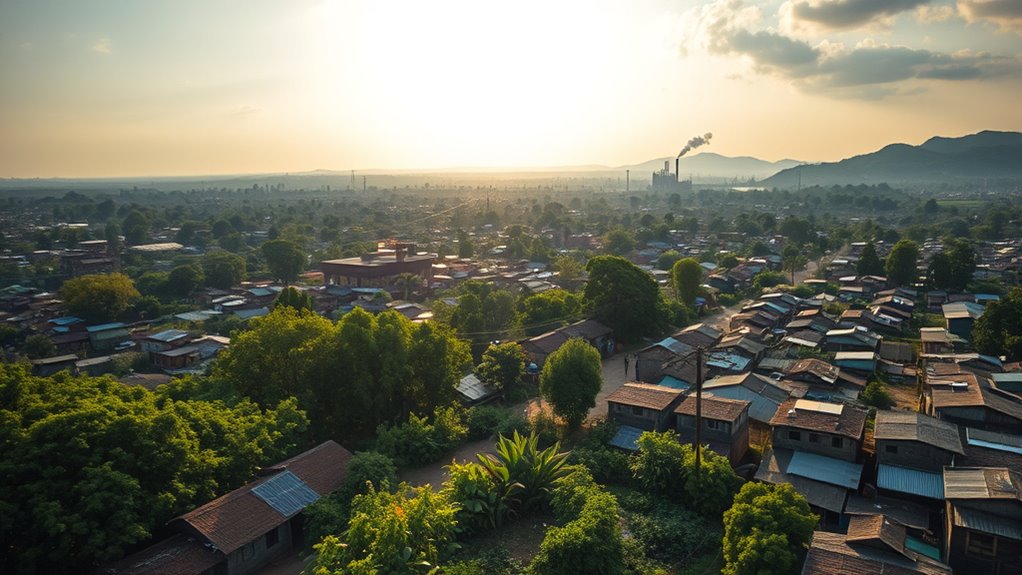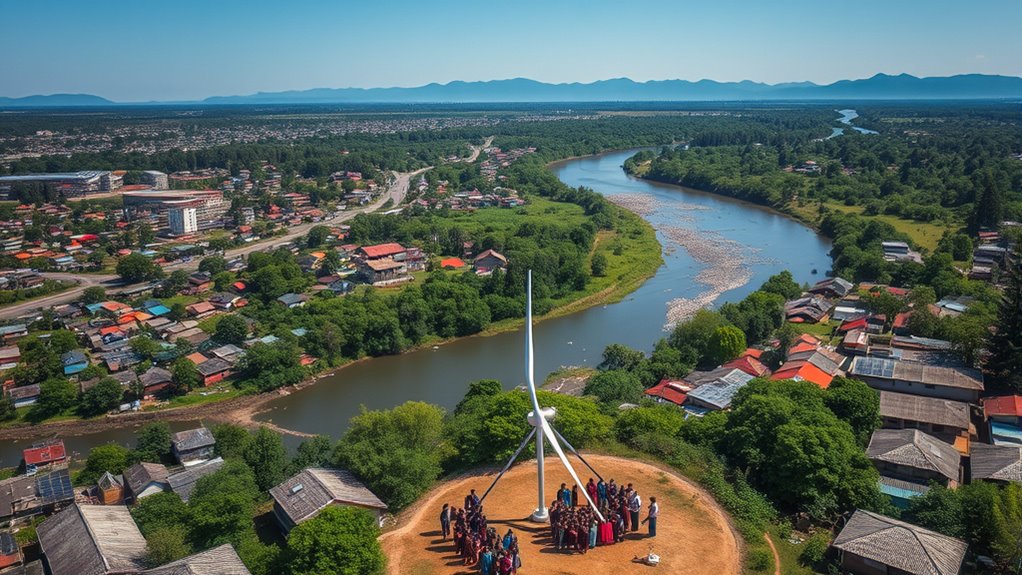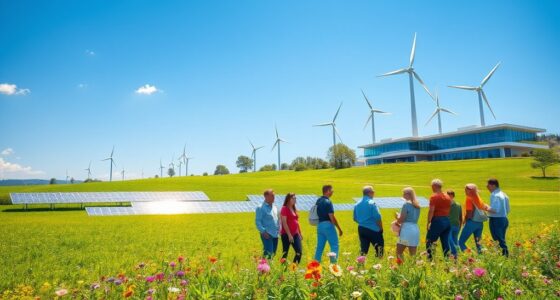In developing nations, effective environmental policies are essential for balancing economic growth with resource preservation and renewable energy adoption. However, challenges like weak governance, enforcement issues, and illegal activities hinder progress. Innovative strategies—such as using satellite monitoring, establishing clear regulations, and engaging communities—are helping strengthen enforcement. Strong policies support sustainable projects, create jobs, and reduce emissions. Keep exploring to discover how these efforts are shaping a sustainable future for these nations.
Key Takeaways
- Developing nations face enforcement challenges due to weak governance and limited resources, hindering environmental policy effectiveness.
- Innovative solutions like satellite monitoring and technology enhance enforcement and real-time tracking of environmental compliance.
- Clear regulations and penalties are essential to motivate adherence and reduce illegal activities such as logging and pollution.
- Strong policy frameworks are vital for supporting renewable energy projects and sustainable development initiatives.
- Public awareness and community engagement strengthen enforcement efforts and promote collective responsibility for environmental protection.

Why do environmental policies in developing nations matter so much? Because the choices you make today can shape the future of millions. Developing countries often face a delicate balancing act: growing their economies while protecting their natural resources. This is where renewable initiatives come into play. They offer a promising path to sustainable development by harnessing solar, wind, and other clean energy sources. When implemented effectively, these initiatives reduce reliance on fossil fuels, cut greenhouse gas emissions, and promote energy independence. But the success of renewable projects hinges on strong policy enforcement. Without it, investments might falter, and projects can stall or be abandoned altogether. Developing nations frequently grapple with weak governance structures, making it challenging to guarantee that policies are not only written but also actively upheld. This lack of enforcement can lead to illegal logging, unregulated mining, and pollution, undermining the very environmental goals policymakers set out to achieve. Strengthening regulatory enforcement is essential to ensure that environmental policies translate into real change. Your role, as someone invested in this landscape, is to understand that policy enforcement isn’t just about creating laws; it’s about making sure those laws translate into tangible change on the ground. Governments need to establish clear regulations, allocate resources for monitoring, and impose penalties for violations. When policy enforcement is lax, it’s easier for industries to bypass regulations, causing long-term harm to ecosystems and communities. Strengthening enforcement mechanisms can involve deploying technology like satellite monitoring to track deforestation or pollution levels in real-time, which can enhance compliance monitoring efforts. It also requires building capacity within institutions so they can effectively oversee compliance and take swift action against offenders. Additionally, fostering public awareness and community engagement can significantly enhance compliance and enforcement efforts. Renewable initiatives are vital, but they require consistent support and enforcement to succeed. You can think of policies as the backbone that holds these initiatives upright. Without proper enforcement, even the most innovative renewable projects might fail to deliver lasting change. Conversely, with strong policy enforcement, renewable energy can become a cornerstone of sustainable development, creating jobs, reducing emissions, and improving quality of life. Developing nations stand at a crossroads, and your understanding of the importance of policy enforcement can influence how these countries prioritize environmental sustainability. By pushing for stronger regulations, accountability, and investments in renewable initiatives, you help pave the way for a cleaner, greener future. It’s a collective effort—one that requires vigilance, innovation, and unwavering commitment to guarantee that environmental policies translate into real-world benefits for everyone.
Frequently Asked Questions
How Do Developing Nations Finance Environmental Initiatives Effectively?
To finance environmental initiatives effectively, you should leverage green financing options, such as bonds and grants, which target sustainable projects. You can also forge public-private partnerships that combine government support with private sector expertise and investment. These strategies help mobilize resources, reduce costs, and guarantee long-term funding, enabling developing nations to implement impactful environmental policies and foster sustainable growth.
What Role Do International Organizations Play in Policy Development?
International organizations play a pivotal role in policy development by fostering international cooperation and providing funding mechanisms. They help developing nations craft effective environmental policies through technical assistance, knowledge sharing, and financial support. Your country benefits from these efforts by accessing grants and resources that strengthen policy frameworks. By engaging with these organizations, you can address environmental challenges more effectively, ensuring sustainable growth and improved ecological outcomes.
How Can Local Communities Influence Environmental Decision-Making?
You can truly make a difference by engaging your community and supporting grassroots movements. When you participate in local initiatives and advocate for sustainable practices, you influence environmental decision-making directly. Your voice adds weight to community engagement efforts, inspiring change from the ground up. Don’t underestimate your power — collective action can shape policies and guarantee your environment reflects your values and needs. Your involvement is crucial for lasting impact.
What Are Successful Examples of Innovative Environmental Policies?
You can look at successful examples of innovative environmental policies that leverage green technology and policy incentives. For instance, some nations have adopted solar energy subsidies or tax credits, encouraging adoption of renewable energy. Others implement policies that promote green technology startups or provide incentives for sustainable practices. These strategies not only reduce environmental impact but also stimulate economic growth, proving that innovative policies effectively drive positive change.
How Do Economic Growth and Environmental Sustainability Balance in Developing Countries?
Did you know that urban expansion in developing countries often increases resource depletion, making balancing economic growth and sustainability tough? You can tackle this by promoting smart growth policies that encourage efficient land use and renewable energy. When you prioritize sustainable infrastructure, you support economic development without compromising environmental health, helping to reduce urban sprawl’s impact. Your efforts can create a future where growth and conservation go hand in hand.
Conclusion
So, here you are, witnessing developing nations juggle growth and sustainability. Ironically, their biggest challenge might be that their best innovations come from necessity—not from well-funded research. While they endeavor to protect the environment, they often rely on outdated methods or international aid, making progress feel slow. But maybe, just maybe, their resilience and creativity will surprise us all, proving that sometimes, the greatest solutions come from the most unexpected places.










